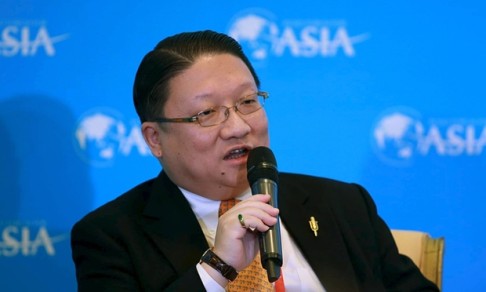
US government investigates ownership of American stations running output from state-run China Radio International

The Federal Communications Commission and the Justice Department are investigating a California firm whose US radio broadcasts are backed by a subsidiary of the Chinese government, officials said.
The investigations come in response to a report published on Monday that revealed the existence of the covert radio network, which broadcasts in more than a dozen American cities, including Washington, Philadelphia, Boston, Houston and San Francisco.
“Based on reports, the FCC will initiate an inquiry into the facts surrounding the foreign ownership issues raised in the stories, including whether the commission’s statutory foreign ownership rules have been violated,” commission spokesman Neil Grace said.
The California firm is owned by James Su, a naturalised US citizen born in Shanghai. Su’s company, G&E Studio, is 60 per cent owned by a subsidiary of Chinese state-run radio broadcaster China Radio International.
The communication commission doesn’t restrict content on US radio stations, except for rules covering indecency, political advertising and children’s programming.
But under US law, it prohibits foreign governments or their representatives from holding a radio license for a US broadcast station.
Foreign individuals, governments and corporations are permitted to hold up to 20 per cent ownership directly in a station and up to 25 per cent in the US parent corporation of a station.
G&E does not own any US stations, but it leases two 50,000-watt stations: WCRW in Washington for more than US$720,000 a year, and WNWR in Philadelphia for more than US$600,000 a year.
Through a different set of limited liability companies, Su owns, co-owns or leases virtually all the air time on at least a dozen other US stations. Those stations carry G&E content, which is produced largely by his West Covina, California studios or by state-run CRI in Beijing.
The news programming on these CRI-backed stations sticks closely to the Chinese government line on a host of issues, including the current military stand-off in the South China Sea between China and the United States.
Su’s spokeswoman declined to comment Monday. Su said in September his radio network abides by US law because he leases air time from stations, rather than owning them outright.
US law also requires anyone inside the United States seeking to influence American policy or public opinion on behalf of a foreign government or group to register with the Justice Department. Public records show that neither Su nor his companies are registered as foreign agents under the law, called the Foreign Agents Registration Act,.
A US law enforcement official said the Justice Department probe began last month after Reuters approached the FBI and prosecutors with questions about Su’s California-based operation.
After receiving inquiries from Reuters last month, Su’s companies deleted two web pages that showcased the relationship between his firms and CRI.
“We are aware of the media reports and can neither confirm nor deny an ongoing review or investigation into the matter,” said Marc Raimondi, a Justice Department spokesman.
“We are committed to continuing to use the full range of tools and authorities under the Foreign Agents Registration Act to ensure proper foreign registration and filings.”
Su said in September that he and his companies comply with all US laws, including the registration act.
Su’s network of CRI-backed stations in the United States is one of three international networks with hidden financial ties to the Chinese broadcaster.
Reuters identified similar networks in Europe and in the Asia-Pacific region. Reporters found that there at least 33 radio stations in 14 countries in CRI’s global network.